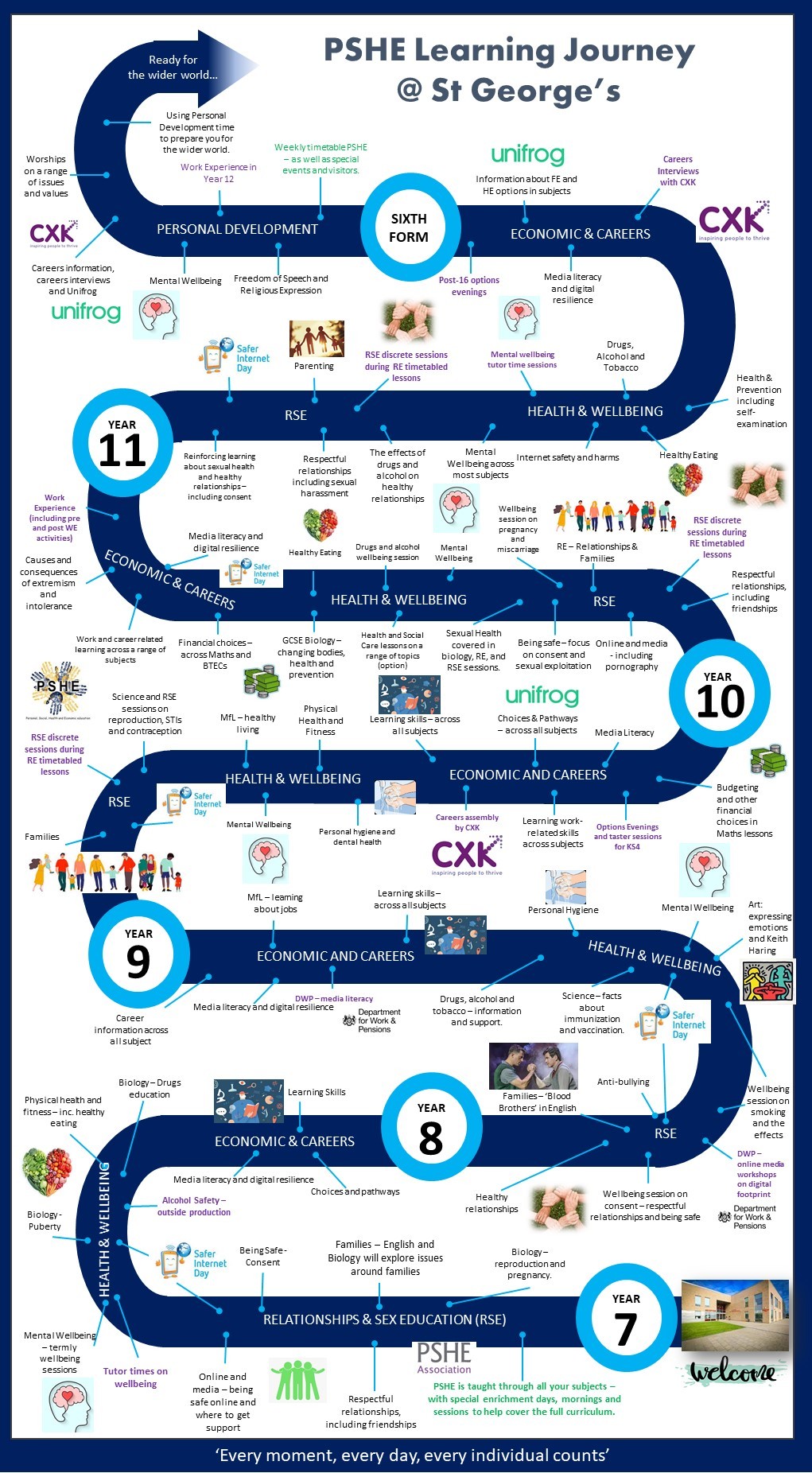- Home
- Secondary
- RSE and PSHE
RSE and PSHE
Today’s children and young people are growing up in an increasingly complex world and living their lives seamlessly on and offline. This presents many positive and exciting opportunities, but also challenges and risks. In this environment, children and young people need to know how to be safe and healthy, and how to manage their academic, personal and social lives in a positive way.
Teaching about mental wellbeing is central to a young person’s development, and a priority for parents is their children’s happiness. We know that children and young people are increasingly experiencing challenges, and that young people are at risk of feeling lonely. The PSHE subject content will give them the knowledge and capability to take care of themselves and receive support if problems arise.
All of this content supports the wider work of St. George’s in helping to deliver our vision so that all members of the school community flourish. We foster pupil wellbeing and develop resilience and character that we know are fundamental to pupils being happy, successful and productive members of society. Pupils take part in a Wellbeing session each term - details can be found HERE.

RE and PSHE Curriculum
Please note that RSE stands for Relationship and Sex Education and PSHE stands for Personal Social and Health Education. As a Church of England school, RSE and PSHE will follow diocesan guidance and cover the statutory requirements of the curriculum. Our full RSE policy including information regarding the right to withdraw from RSE can be found here.
In primary, PSHE is taught weekly for a one-hour lesson, as well as during collective worship and enrichment activities that cover elements of the PSHE curriculum throughout the year.
At secondary, all pupils at key stage 3 have a term of Personal Development in each year (7, 8 and 9) as part of the Creative subjects rotation. Secondary PSHE education is covered across the school in every year group across all the curriculum subjects, including enrichment and wellbeing sessions. This is monitored and reviewed regularly by the staff and governing body. Students in our Sixth Form also have weekly Personal Development lessons.
In addition, visiting speakers and external visits also contribute to the curriculum across the school. In the past year we have had a range of organisations deliver age-appropriate sessions on elements of the PSHE curriculum to pupils.
The RSE and PSHE programme ensures that pupils revisit topics in order to build upon their existing knowledge and skills throughout their time at the school. It is intended that RSE and PSHE will be taught through interactive learning activities as appropriate.
Our PSHE curriculum develops learning and results in the acquisition of knowledge and skills which will enable children to access the wider curriculum and prepare them to be a global citizen now and in their future roles within a global community. It promotes the spiritual, moral, cultural, mental and physical development of pupils, preparing them for the opportunities, responsibilities and experiences for later life
The PSHE and RSE curriculum is regularly reviewed by our governing board.
RSE and Health Education
The aim of RSE is to give young people the information they need to help them develop healthy, nurturing relationships of all kinds, not just intimate relationships. It should enable them to know what a healthy relationship looks like and what makes a good friend, a good colleague and a successful marriage or other type of committed relationship. It should also cover contraception, developing intimate relationships and resisting pressure to have sex (and not applying pressure). It should teach what is acceptable and unacceptable behaviour in relationships.
Students will develop knowledge on the following topics by the end of secondary:
- Families
- Respectful relationships, including friendships
- Online and Media
- Being Safe
- Intimate and sexual relationships, including sexual health
- The law.
For a full overview of the statutory RSE and Health Education curriculum for primary and secondary pupils can be found here.
Physical Health and Mental Wellbeing
The aim of teaching pupils about physical health and mental wellbeing is to give them the information that they need to make good decisions about their own health and wellbeing. It should enable them to recognise what is normal and what is an issue in themselves and others and, when issues arise, know how to seek support as early as possible from appropriate sources.
Physical health and mental wellbeing are interlinked, and it is important that pupils understand that good physical health contributes to good mental wellbeing, and vice versa.
Students will develop knowledge on following topics by the end secondary:
- Mental Wellbeing
- Internet safety and harms
- Physical health and fitness
- Healthy eating
- Drugs, alcohol and tobacco
- Health and prevention
- Basic first aid
- Changing adolescent body
For a full overview of the statutory health and wellbeing curriculum for primary and secondary schools can be found here (click here).
Moral and Values Framework
The school believes that RSE and PSHE should be delivered within the following framework and the RSE and PSHE programme will promote:
- self respect;
- respect and tolerance towards others who may have different backgrounds, cultures, feelings, views and sexuality;
- taking account of other people’s feelings;
- mutual support and co-operation;
- honesty;
- accepting responsibility for the consequences of actions;
- the right of people to hold their own views;
- not imposing views on other people;
- the right not to be abused by other people or taken advantage of;
- the right to receive accurate information about sex and relationship issues.
Equal Opportunities
The school ensures that effective RSE and PSHE is available to all pupils and that the RSE and PSHE programme responds to the needs of individuals with additional educational needs and takes all cultures, faiths and family backgrounds into consideration.


